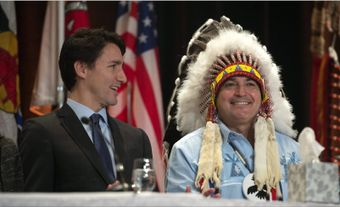Indigenous Services Canada (part of the former Indigenous/Indian and Northern Affairs Canada or INAC) was created by the federal government in 2017 to provide and support the delivery of services such as health care, child care, education and infrastructure to First Nations, Métis and Inuit communities. The overarching vision of the department is to support self-determination as a means of providing Indigenous peoples with the power to deliver their
own services.

Creation of the Department
In 2017, the government of Justin Trudeau implemented a recommendation of the Royal Commission on Aboriginal Peoples (1996) by dissolving Indigenous and Northern Affairs Canada (INAC) and replacing it with two new departments: Indigenous Services Canada andCrown-Indigenous Relations and Northern Affairs Canada. ( See also Federal Departments of Indian and Northern Affairs.)
Crown-Indigenous Relations and Northern Affairs oversees Indigenous-government relations, including matters pertaining to treaty rights and self-government. It also oversees the concerns of Northern communities. The department has two ministers: a minister of Crown-Indigenous Relations and a minister of Northern Affairs. Indigenous Services works toward improving the quality of services delivered to Indigenous peoples, with the eventual goal of having these services delivered by Indigenous communities rather than the Crown. Indigenous Services has also taken control of the First Nations and Inuit Health Branch, which was transferred from Health Canada to the new department in 2017. The first minister of Indigenous Services Canada was Jane Philpott.
Carolyn Bennett, the first minister of Crown-Indigenous Relations and Northern Affairs, described INAC as “outdated and paternalistic... designed to enforce the Indian Act.” The new departments, on the other hand, are “distinctions-based and rooted in the recognition of rights, respect, co-operation and partnership.” The federal government described the restructuring of this department as a “next step” to abolishing the Indian Act.
Mandate
Indigenous Services Canada is responsible for improving access to services for First Nations, Métis and Inuit communities, and to support self-determination as a means of empowering Indigenous peoples to eventually control the delivery of services in their community. The department aims to move forward with this mandate in partnership with First Nations, Métis and Inuit peoples, while also recognizing the differences among these diverse communities.
Select Priorities and Developments
Indigenous Services has outlined various priority areas since its creation, including improving health outcomes, quality education, family and child welfare, infrastructure, and developing a new fiscal relationship with Indigenous communities.
The department seeks to improve the health of Indigenous peoples by providing, among other provisions, long-term funding for health care and sustainable and sufficient health resources in Indigenous-led health systems. (See also Health of Indigenous Peoples in Canada.) Supporting culturally-appropriate curricula and Indigenous-led schooling is part of another priority to improve education services in Indigenous communities. (See also Education of Indigenous Peoples in Canada.)
The department also seeks to improve family and child welfare. Toward this end, Indigenous Services is continuing to address Call to Action 4 of the Truth and Reconciliation Commission by introducing a new piece of legislation, co-developed with Indigenous communities: Act respecting First Nations, Inuit and Métis children, youth and families (2019). Another area of interest is in creating and sustaining a reliable infrastructure, including the improvement of housing,water and wastewater, roads and energy systems. (See also Social Conditions of Indigenous Peoples.)
The department also aims to build a new fiscal relationship with Indigenous communities. Indigenous Services seeks to provide long-term funding solutions as well as to support Indigenous-led services and the creation of fiscal relationships based on mutual accountability.

 Share on Facebook
Share on Facebook Share on X
Share on X Share by Email
Share by Email Share on Google Classroom
Share on Google Classroom


